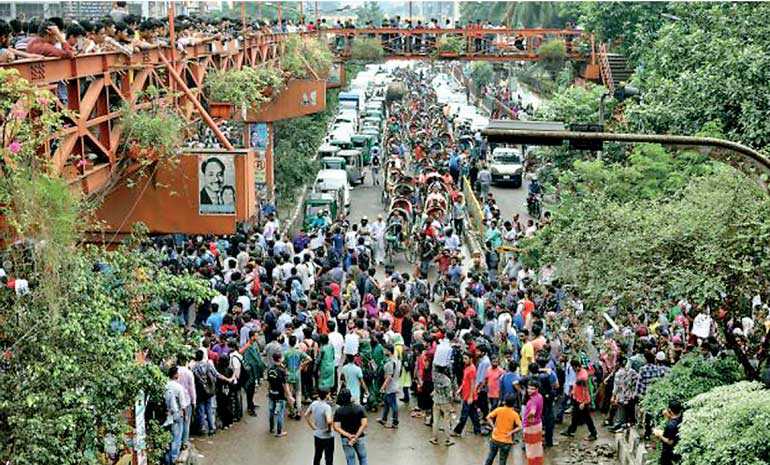Thursday Feb 26, 2026
Thursday Feb 26, 2026
Friday, 31 August 2018 00:10 - - {{hitsCtrl.values.hits}}

Students block a road as they join in a protest over recent traffic accidents that killed a boy and a girl, in Dhaka, in Dhaka, Bangladesh, 5 August, 2018 - REUTERS/File Photo
DHAKA (Reuters): Bangladesh’s main opposition party, in disarray since its leader Khaleda Zia was jailed in February, received an unexpected boost this month – days of protests by tens of thousands of students that have shaken the government ahead of a December election.
What began as an outpouring of anger over the failings of an unregulated transport industry after a speeding bus killed two students in Dhaka, quickly escalated into the widest anti-government protests in the South Asian nation in years, providing a focus for discontent with what critics see as Prime Minister Sheikh Hasina’s increasingly authoritarian rule.
“The government is trying to control everything,” said Rabiul Alam, 28, who works in a curtain showroom in Dhaka. “There is no space, no freedom, no democracy. You can’t even criticise the government on Facebook.”
Alam, who is a voter in his hometown in Barishal, in southern Bangladesh, said he would vote for the first time this year – for Khaleda’s Bangladesh Nationalist Party (BNP). Analysts say such views are on the rise around the country.
The protests, which saw students directing traffic for days in the choked streets of Dhaka, demanding to check drivers’ licences and vehicles’ roadworthiness, have put Hasina and her ruling Awami League on the defensive in the run-up to an election she was widely expected to win.
The BNP says it was not involved in starting the protests, but is looking to capitalise on the opening they have been offered with rallies across the country aimed at pressuring the government to release its leader.
“The protest was spontaneous and non-political,” said BNP secretary-general Mirza Fakhrul Islam Alamgir. “The students have showed us the state is in need of repair.”
The government has blamed the BNP for inciting the students.
To quell the protests, Hasina announced compensation to the victims’ families and the government agreed to raise the maximum jail time for rash driving to five years from three.
But heavy-handed policing of demonstrations and a wave of arrests fuelled accusations that free speech is increasingly being curtailed. The government said its actions were necessary to restore order.
The protests erupted after the driver of a speeding private bus lost control in a congested part of Dhaka and ploughed into a bus stop, killing two students. Most private bus drivers in Bangladesh do not get paid a salary, but earn commission for the number of people they pick up, leading them to race each other for passengers.
Demonstrations quickly spread to the cities of Chittagong, Khulna, Rajshahi, Sylhet, Rangpur and Mymensingh, as the protests struck a chord.
Hasina’s government, which began her term in 2009 cracking down on Islamist groups and sending top leaders to the gallows for war crimes during the 1971 independence war, is seen by some as increasingly high-handed after nearly a decade in power.
In February, a court handed Khaleda, a two-term prime minister with whom Hasina shares a long and bitter rivalry, a five-year sentence for corruption – charges that she says are part of a plot to keep her and her family out of politics.
In recent months, Hasina has faced criticism that her political opponents are being swept up in the ongoing drive against militancy, corruption and drugs, which has also seen security forces accused of overstepping the law.
The police’s response to the protests – by firing rubber bullets, water cannons, and teargas at unarmed students – has drawn international criticism for the government, including from the United States and United Nations.